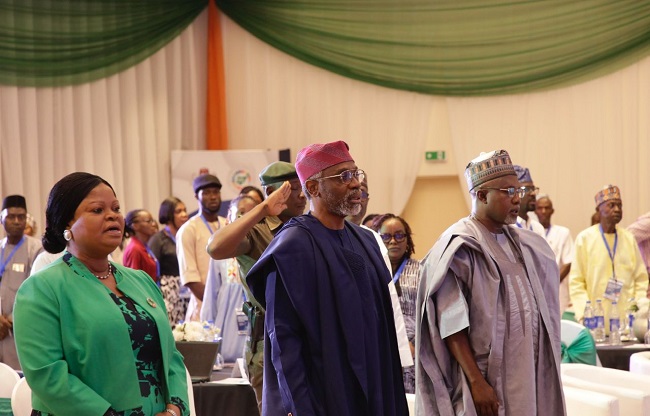The Chief of Staff to the President, Femi Gbajabiamila, says Nigeria must intensify its internal strategies to achieve sustainable development with shrinking global multilateral cooperation.

Gbajabiamila said this during the official validation of the 2025 Voluntary National Review (VNR), the inauguration of Nigeria SDGs Progress Report 2024 and unveiling of Inclusive Data Charter (IDC) Action Plan, on Wednesday, April 30, 2025, in Abuja.
“In a shrinking multilateral space, we must look inwards for sustainable solutions to our economic, social and environmental challenges,” he stated.
Gbajabiamila underscored the vital role of the SDGs as a strategic framework to guide these efforts.
He noted that Nigeria’s commitment – demonstrated by the successful conduct of VNRs in 2017, 2020, and now 2025 – reflected the government’s resolve to meet the 2030 target.
He commended Princess Adejoke Orelope-Adefulire, the Senior Special Assistant to the President on SDGs, for her tireless leadership in coordinating the process.
He explained that the 2025 VNR followed six regional consultations held in March 2025 across Nigeria’s six geopolitical zones.
He said exercise assessed progress, identified gaps, and gathered input for the upcoming High-Level Political Forum (HLPF) at the United Nations in July.
He explained that the consultations underscored the importance of inclusive, participatory, and evidence-based approaches to fast tracking the implementation of SDG.
Gbajabiamila also called on ministries, departments, agencies, development partners, the private sector, academia and civil society to deepen collaboration and mobilise resources to ensure no one was left behind in Nigeria’s sustainable development journey.
He reiterated the Tinubu administration’s unwavering commitment to the SDGs, describing sustainable development as a cardinal objective within the Renewed Hope Agenda.
He conveyed President Tinubu’s best wishes, noting his strong interest in achieving the SDGs.
“When world leaders adopted the 2030 Agenda for Sustainable Development, they envisioned a just and truly egalitarian society where no one is left behind.
“Achieving the SDGs will mean ending poverty and hunger, safeguarding our ecosystem and ensuring our people live in peace and prosperity by 2030 and beyond,” Gbajabiamila said.
In her welcome address, Orelope-Adefulire told stakeholders that the national validation workshop reinforced Nigeria’s deepening commitment to the 2030 Agenda.
She noted that nearly a decade after the adoption of the SDGs at the 70th UN General Assembly, Nigeria continued to demonstrate resolve in achieving them.
She referenced the 2024 United Nations SDGs Report, which showed that only 17 per cent of global targets were on track, with developing countries and the poorest populations bearing the greatest burdens.
“Lack of progress towards the SDGs is universal, but developing countries and the world’s poorest people are bearing the brunt,” she remarked.
Orelope-Adefulire described the VNR process as a critical component of the HLPF review mechanism, offering transparency and accountability at the national level.
She noted that Nigeria’s 2025 VNR was the product of extensive consultations across all six geopolitical zones.
She said the consultations included targeted engagements with persons with disabilities, youth and children.
“This national validation workshop not only reaffirms our commitment to the 2030 Agenda but also demonstrates our resolve to ground implementation in inclusive, evidence based, and participatory principles,” she said.
She urged participants to critically assess the VNR’s findings and recommendations to ensure a robust final report.
The Nigeria SDGs Progress Report 2024, unveiled at the workshop, provided a detailed goal-by-goal analysis of achievements and setbacks, while offering strategic recommendations for policymakers at all levels.
Orelope-Adefulire also announced the inauguration of Nigeria’s Inclusive Data Charter Action Plan 2024, developed in partnership with the National Bureau of Statistics and Sightsavers Nigeria.
“Our commitment to leaving no one behind must be data driven and evidence based,” she said.
She added that the IDC Plan reinforced Nigeria’s commitment to disaggregated and inclusive data systems as the foundation of accountable development.
She praised the Multi-Stakeholder Core Working Group for its coordination of the VNR process, acknowledging its diverse membership spanning government agencies, the UN system, civil society, academia, and the disability community.
She also thanked Sightsavers Nigeria for its support in ensuring the active participation of persons with disabilities.
Mr. Mohamed Fall, the United Nations Resident Coordinator in Nigeria, delivered a goodwill message in which he commended the Federal Government for its inclusive approach to the VNR and reiterated the UN’s ongoing technical and financial support.
“With less than five years remaining, the SDGs are globally off track. But Nigeria’s participatory approach gives us hope that the course can still be corrected,” he stated.
Fall highlighted Nigeria’s role among the 39 countries presenting VNRs at the 2025 HLPF, offering a platform to showcase transformative and science-based strategies.
He urged the workshop to produce actionable recommendations to address challenges such as poverty, inequality and climate change.
The Nigeria Governors’ Forum (NGF) echoed similar sentiments. Represented by Mr. Eghosa Omoigui, Assistant Director, Mr. Abdulateef Shittu, NGF Director General, cited subnational progress from Kwara, Lagos, Gombe and Edo states as proof of local innovation driving change.
“Resource gaps, data limitations, and climate impacts test our resilience, but they sharpen our resolve to act smarter and leave no one behind,” he said.
He added that the NGF was committed to supporting states in localising the SDGs through innovation, partnerships and knowledge sharing.
He urged participants to transform the validation process into a renewed commitment to the 2030 Agenda, stressing, “Nigeria’s story is one of resilience, partnership, and the promise of delivering on sustainable development.”
By Salif Atojoko
